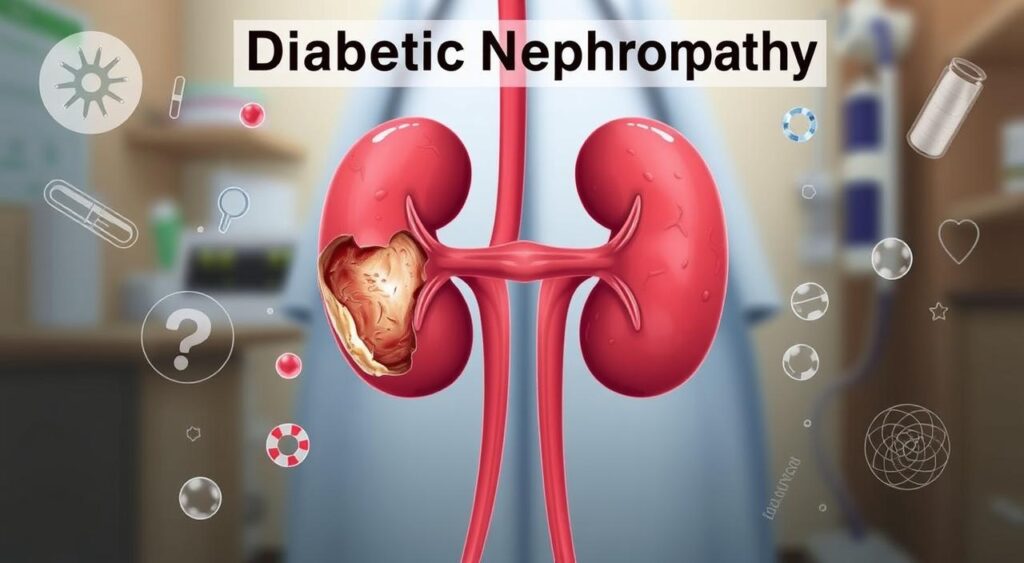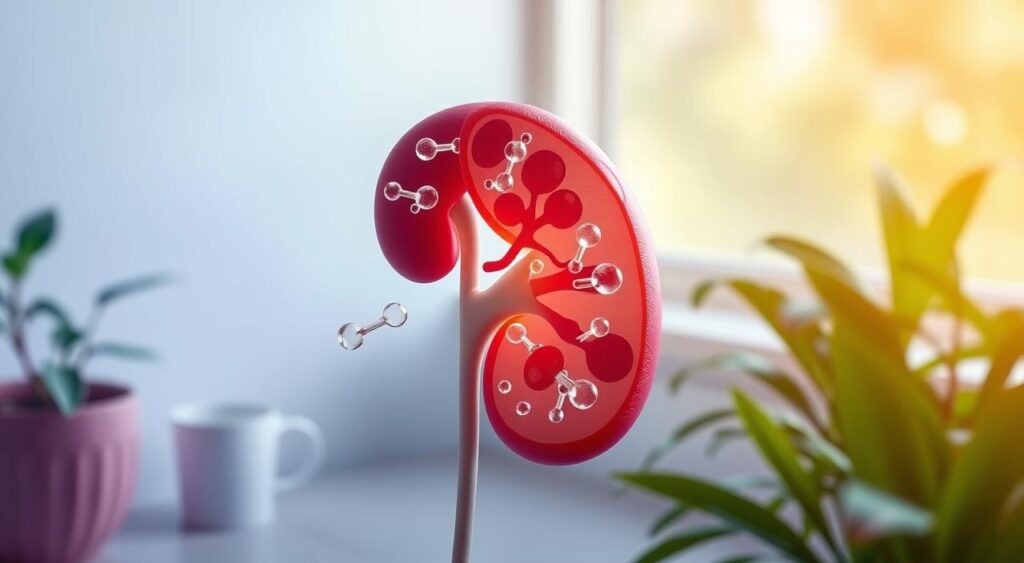A staggering 40% of people with diabetes will develop diabetic nephropathy, a type of kidney disease. This can lead to kidney failure. It’s a serious complication of diabetes that affects how the kidneys filter waste and excess fluids.
Understanding the symptoms, causes, and treatment options is crucial. This knowledge helps manage diabetic nephropathy and kidney disease effectively.

Diabetic nephropathy is a major concern for those with diabetes. It can cause kidney failure and other serious health issues. Knowing the causes and symptoms helps prevent or manage the condition.
By taking steps to prevent or manage it, individuals can reduce their risk of kidney damage and failure.
Key Takeaways
- Diabetic nephropathy is a common complication of diabetes that can lead to kidney failure.
- Understanding the symptoms and causes of diabetic nephropathy is crucial for preventing and managing the condition.
- Treatment options are available for diabetic nephropathy and kidney disease, including lifestyle modifications and medical interventions.
- Early detection and treatment of diabetic nephropathy can help prevent kidney damage and failure.
- Managing blood sugar levels and blood pressure is essential for reducing the risk of diabetic nephropathy and kidney disease.
- Working with a healthcare team can help individuals with diabetic nephropathy and kidney disease develop an effective treatment plan.
Understanding Diabetic Nephropathy
Diabetic nephropathy is a common problem for people with diabetes. It happens when high blood sugar damages the kidneys. This damage can lead to nephropathy treatment and other serious issues. Knowing about diabetic nephropathy is key to managing it and preventing more damage.
The kidneys are important for filtering waste and extra fluids. If diabetes is not controlled, the kidneys work too hard. This can cause damage and scarring. If not treated, it can lead to kidney failure.
Some important things to know about diabetic nephropathy include:
- High blood sugar levels, which can damage the kidneys over time
- Genetic predisposition, which can increase the risk of developing diabetic nephropathy
- Other health conditions, such as high blood pressure, which can make kidney damage worse
To manage nephropathy treatment and diabetes complications, a full approach is needed. This includes lifestyle changes, medication, and regular kidney function checks. By understanding the causes and risk factors, people can protect their kidneys and prevent further damage.
Early detection and treatment of diabetic nephropathy are crucial. They help prevent long-term kidney damage and other diabetes problems. By working with healthcare providers and following a treatment plan, people can manage their condition. This reduces the risk of nephropathy and other complications.
| Diabetes Complication | Description |
|---|---|
| Diabetic Nephropathy | Kidney damage and scarring due to high blood sugar levels |
| Kidney Failure | Loss of kidney function, requiring dialysis or transplant |
Risk Factors for Kidney Disease in Diabetics
People with diabetes face a higher risk of diabetic kidney damage. This can lead to chronic kidney disease and even renal failure. Poor blood sugar control, high blood pressure, and genetics play big roles in this risk.
Here are some key risk factors for kidney disease in diabetics:
- Poor blood sugar control, which can damage the blood vessels in the kidneys
- High blood pressure, which can put extra strain on the kidneys
- Genetic predisposition, as some people may be more susceptible to kidney disease
- Family history of kidney disease
- Age, as the risk of kidney disease increases with age
Keeping renal function in check is vital for diabetics. This means managing blood sugar, controlling blood pressure, and adopting a healthy lifestyle. By understanding these risks and taking action, diabetics can lower their chance of kidney disease and diabetic kidney damage.
The Progressive Stages of Diabetic Nephropathy
Diabetic nephropathy is a serious problem for people with diabetes. It can cause kidney failure if not treated. The disease goes through several stages, each with its own signs and symptoms. Knowing these stages is key to managing kidney disease and stopping further harm.
Early Stage Changes
In the early stages, the kidneys might look normal but function slightly differently. This stage is marked by microalbuminuria, where small amounts of albumin are found in the urine. Diabetic nephropathy stages can be managed with lifestyle changes and medicine.
Middle Stage Progression
As the disease gets worse, the kidneys suffer more damage and function less well. This stage is marked by proteinuria, where a lot of protein is found in the urine. It’s important to keep track of the disease’s progress and adjust treatments to avoid more damage.
Advanced Stage Manifestations
In the advanced stages, the kidneys are badly damaged, and kidney failure is near. This stage is marked by end-stage renal disease, which means dialysis or a kidney transplant is needed. If symptoms get worse or don’t go away, it’s vital to see a doctor right away.
| Stage | Characteristics | Symptoms |
|---|---|---|
| Early | Microalbuminuria | Mild swelling, fatigue |
| Middle | Proteinuria | Swelling, fatigue, high blood pressure |
| Advanced | End-stage renal disease | Severe swelling, fatigue, nausea, vomiting |
Common Symptoms and Warning Signs
Diabetic nephropathy can cause a range of symptoms and warning signs. These may develop gradually over time. Changes in urination are common, including an increase or decrease in frequency, or the presence of blood or protein in the urine.
Other symptoms may include swelling in the feet, ankles, or hands, as well as fatigue and weakness. It is essential to recognize these symptoms early and seek medical attention to prevent further kidney damage.
Symptoms and warning signs of diabetic nephropathy may include:
- Changes in urination frequency or pattern
- Presence of blood or protein in the urine
- Swelling in the feet, ankles, or hands
- Fatigue and weakness
Early recognition and treatment of diabetic nephropathy can help slow disease progression and prevent complications. If you are experiencing any of these symptoms, it is crucial to consult with your healthcare provider for proper evaluation and management.
Diagnosis and Testing Methods
Diagnosing kidney disease in patients with diabetes complications involves several steps. First, we do initial screening tests. Then, we use advanced diagnostic procedures to find any kidney damage or disease early.
At first, we check urine and blood for protein and high blood sugar. These tests help spot those at risk of kidney disease.
Advanced Diagnostic Procedures
For a confirmed diagnosis, we might need imaging tests and kidney biopsies. These help us see how much damage there is. They guide us in choosing the right treatment.
Monitoring Protocols
Keeping an eye on kidney disease is key, especially for those with diabetes. We track blood sugar, blood pressure, and kidney function. This helps prevent more damage and manage the disease well.
Knowing how to diagnose kidney disease helps those with diabetes complications. They can take steps to manage their condition and avoid more kidney damage.
| Test | Purpose |
|---|---|
| Urine test | To check for protein in the urine |
| Blood test | To check for elevated blood sugar levels |
| Imaging test | To visualize the kidneys and detect any damage |
| Kidney biopsy | To examine kidney tissue and confirm a diagnosis |
The Connection Between Blood Sugar and Kidney Function
For people with diabetes, controlling blood sugar is key to protect their kidneys. High blood sugar can harm the kidneys’ blood vessels. This makes it hard for them to filter waste from the blood. This can cause diabetic renal care problems, like kidney disease and failure.
To stop kidney damage, keeping blood sugar in check is vital. This can be done with the right mix of medicine, diet, and exercise. It’s also important to regularly check blood sugar and kidney function for diabetic renal care.
Here are some ways to manage blood sugar and avoid kidney damage:
- Maintaining a healthy diet
- Exercising regularly
- Monitoring blood sugar levels
- Taking medication as prescribed
By taking these steps and working with a healthcare team, people with diabetes can lower their risk of kidney damage. It’s crucial to be proactive in managing blood sugar to protect the kidneys.

Proper management of blood sugar levels is critical for preventing kidney damage and ensuring overall health.
| Factor | Importance |
|---|---|
| Blood Sugar Control | High |
| Diet | High |
| Exercise | Medium |
| Medication | High |
Medical Treatment Options
For those with diabetic kidney disease, finding the right treatment is key. It helps slow down the disease’s progress. There are many ways to manage diabetic kidney damage.
Medicines are a big part of treating nephropathy. They help lower protein in the urine and slow the disease. ACE inhibitors and ARBs are often used. They have been shown to help manage diabetic kidney damage well.
Medications and Their Effects
- ACE inhibitors: reduce proteinuria and slow disease progression
- ARBs: similar to ACE inhibitors, with added benefits for certain patients
Surgical Interventions
In severe cases, surgery like kidney transplants might be needed. These surgeries can greatly improve life quality and extend life.
Emerging Therapies
Scientists are looking into new treatments. This includes stem cell therapy and gene therapy for diabetic kidney damage. These new methods could lead to better treatments and lower disease risk.
Lifestyle Modifications for Kidney Protection
Lifestyle changes are key in managing kidney disease. Healthy habits can protect kidneys and slow disease progress. A balanced diet, regular exercise, and stress control are vital for health.
Some important lifestyle changes for kidney health include:
- Eating a healthy, balanced diet that is low in salt, sugar, and unhealthy fats
- Staying hydrated by drinking plenty of water and limiting sugary drinks
- Engaging in regular physical activity, such as walking or swimming, to help manage blood sugar and blood pressure
- Getting enough sleep and practicing stress-reducing techniques, such as meditation or deep breathing
By making these lifestyle changes, people can manage kidney disease better.
According to the American Diabetes Association, lifestyle modifications can help prevent or delay the onset of diabetic renal care. By working with a healthcare team and making healthy lifestyle choices, individuals can take control of their health and reduce their risk of kidney disease.
By being proactive in managing kidney disease and diabetic renal care, people can protect their kidneys. With the right lifestyle changes and medical care, managing kidney disease is possible. This can prevent long-term damage.
| Lifestyle Modification | Benefits for Kidney Health |
|---|---|
| Healthy Diet | Helps manage blood sugar and blood pressure, reducing strain on the kidneys |
| Regular Exercise | Helps manage blood sugar and blood pressure, improving overall health and well-being |
| Stress Management | Helps reduce stress and anxiety, which can contribute to kidney damage |
Dietary Guidelines for Diabetic Kidney Disease
People with diabetic nephropathy need a special diet to manage their health. A good diet can slow down kidney disease and lower the risk of problems. The main goal is to keep blood sugar, blood pressure, and cholesterol in check.
It’s key to eat foods that are full of nutrients but low in sodium, sugar, and bad fats. Lean proteins like chicken, fish, and tofu are great choices. Also, fresh fruits, veggies, whole grains, and low-fat dairy are good for you.
Recommended Foods
- Lean proteins: chicken, fish, tofu
- Fresh fruits: berries, citrus fruits, apples
- Vegetables: leafy greens, bell peppers, carrots
- Whole grains: brown rice, quinoa, whole-wheat bread
- Low-fat dairy products: milk, yogurt, cheese
Foods to Avoid
- High-sodium foods: processed meats, canned soups, frozen meals
- High-sugar foods: sugary drinks, baked goods, candy
- Unhealthy fats: fried foods, processed snacks, full-fat dairy products

Eating right, staying active, and taking medicine can help manage diabetic nephropathy. By following these diet tips and working with a healthcare team, you can take charge of your health. This can improve your overall well-being.
| Food Group | Recommended Daily Intake |
|---|---|
| Protein | 0.8-1 gram per kilogram of body weight |
| Fat | 20-30% of total daily calories |
| Carbohydrates | 45-65% of total daily calories |
Managing Blood Pressure and Other Complications
Diabetes complications, like nephropathy, can cause serious health problems if not handled right. Nephropathy treatment often means controlling blood pressure to protect the kidneys. High blood pressure can make kidney disease worse, so it’s key to keep it in check.
Here are some ways to manage blood pressure:
- Medications: such as ACE inhibitors or beta blockers
- Lifestyle changes: like eating well, exercising, and reducing stress
- Regular checks: to watch blood pressure and adjust treatments as needed
It’s also crucial to tackle other issues linked to diabetic nephropathy. This includes treating anemia, bone diseases, and other problems that can come from kidney disease. By tackling diabetes complications head-on, people can lower their risk of serious health issues.
Working with a healthcare team and following a tailored treatment plan can help manage diabetic nephropathy. This might include a mix of medicines, lifestyle changes, and regular check-ups. This approach aims to prevent more problems and improve health outcomes.
Working with Your Healthcare Team
Managing diabetic kidney damage needs teamwork between patients and their healthcare team. This team includes nephrologists, dietitians, and primary care physicians. They work together to keep an eye on kidney health and create a treatment plan just for you.
Role of Different Specialists
Each specialist has a key role in handling diabetic kidney disease. Nephrologists focus on kidney care. Dietitians help with meal plans that support kidney health. Primary care physicians manage overall health and coordinate with other specialists.
Creating a Treatment Plan
A treatment plan for diabetic kidney disease usually includes medicine, lifestyle changes, and regular kidney checks. It’s important for patients to work with their healthcare team to create a plan that fits their needs and health goals.
When to Seek Emergency Care
If you have severe symptoms or complications, like sudden kidney function changes or signs of kidney damage, seek emergency care right away. Recognizing warning signs and acting quickly is crucial to prevent more damage.
By working with your healthcare team and following a detailed treatment plan, you can manage diabetic kidney disease well. This helps protect your kidney function.
| Specialist | Role |
|---|---|
| Nephrologist | Kidney care and management |
| Dietitian | Meal planning and nutrition advice |
| Primary Care Physician | Overall health and care coordination |
Conclusion
Managing diabetic nephropathy is complex but doable. Knowing about kidney disease can help a lot. By learning about it and taking care of yourself, you can improve your kidney health.
Regular doctor visits and keeping an eye on your blood sugar and blood pressure are crucial. Making healthy lifestyle choices also helps your kidneys. With the right team and a positive attitude, you can manage diabetic nephropathy well.
Every small step towards better kidney health is important. Get support from your doctors, make healthy food choices, and watch your condition closely. Together, we can make diabetic nephropathy less scary and more manageable.
FAQ
Q: What is diabetic nephropathy?
A: Diabetic nephropathy is a serious problem linked to diabetes. It can damage the kidneys and lead to failure. High blood sugar levels harm the kidneys’ filters over time, making them less effective.
Q: What are the risk factors for developing diabetic nephropathy?
A: Poor blood sugar control and high blood pressure are big risks. Genetics and how long you’ve had diabetes also play a part. Keeping blood sugar and blood pressure in check can help avoid kidney damage.
Q: What are the stages of diabetic nephropathy?
A: Diabetic nephropathy goes through several stages. These include early changes, increased protein in the urine, and decreased kidney function. The final stage can lead to the need for dialysis or a transplant.
Q: What are the common symptoms of diabetic nephropathy?
A: Early stages often have no symptoms. But as it gets worse, you might notice swelling, frequent urination, and fatigue. You could also feel nauseous, lose your appetite, and have trouble concentrating.
Q: How is diabetic nephropathy diagnosed?
A: Doctors use several tests to diagnose it. These include urine tests for protein, blood tests for kidney function, and imaging to look at the kidneys. Sometimes, a kidney biopsy is needed to confirm the diagnosis.
Q: How is diabetic nephropathy treated?
A: Treatment aims to slow kidney damage and prevent complications. It includes medications to control blood pressure and blood sugar, dietary changes, and, in severe cases, dialysis or a transplant.
Q: Can lifestyle changes help manage diabetic nephropathy?
A: Yes, making healthy lifestyle choices can help. Eating a low-sodium diet, staying active, and managing weight are important. Also, managing stress and getting enough sleep can help.
Q: When should I seek medical attention for diabetic nephropathy?
A: Seek medical help if you notice changes in urination, swelling, fatigue, nausea, or trouble concentrating. Regular check-ups with your healthcare team are also key to monitoring your kidney health.
